Active Shooter Alert Issued at Brown University

© Tony Luong for The New York Times

© Tony Luong for The New York Times

 BBC
BBCTwo US soldiers and a US civilian interpreter have been been killed in Syria in an ambush by a lone Islamic State gunman, the US military has said.
The Pentagon said three other service members were injured in the attack, during which the gunman was "engaged and killed".
The identities of those killed are being withheld for 24 hours until their next of kin have been informed.
Defence Secretary Pete Hegseth, said: "Let it be known, if you target Americans - anywhere in the world you will spend the rest of your brief, anxious life knowing the United States will hunt you, find you, and ruthlessly kill you."
This breaking news story is being updated and more details will be published shortly. Please refresh the page for the fullest version.
You can receive Breaking News on a smartphone or tablet via the BBC News App. You can also follow @BBCBreaking on X to get the latest alerts.

在南非(Afrique du Sud),由纳尔逊·曼德拉(Nelson Mandela)创立的[非国大](ANC)于本周五在约翰内斯堡(Johannesburg)结束为期五天的全国理事大会(2025年12月08日星期一至2025年12月12日星期五)。据本台法广(RFI)非洲通讯员发自当地的法文报道,这个全称为[非洲人国民大会](Congrès National Africain)的南非历史性政党承认有财务问题。
据本台法广非洲组(RFI Afrique)的法文报道,南非[非国大](ANC)刚刚闭幕的这届全国理事大会是一次例会,让其得以评估自身状况。除了由于支持率下跌的制约之外,该党于2024年06月开始了三十年以来的首次联合执政。尤其是该党反复出现的财务问题令人感到不安。
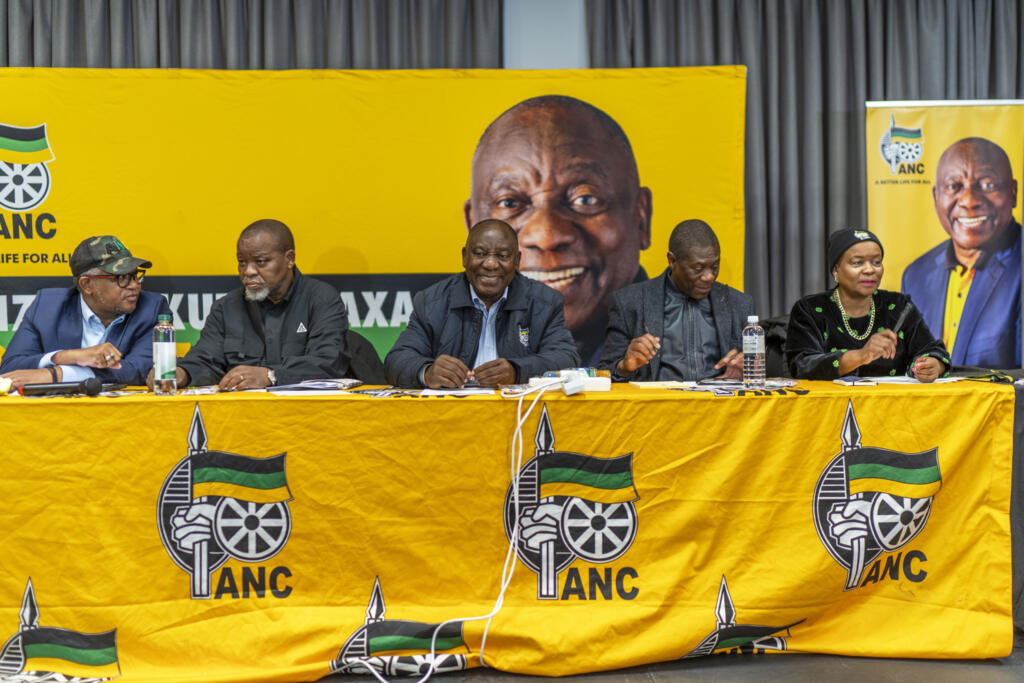
-- [非国大]代表们聚会之际出现雇员讨薪的示威 --
本台法广(RFI)非洲通讯员克莱尔(Claire)2025年12月12日周五发自约翰内斯堡(Johannesburg)的消息说,在南非,这场聚会于本周早些时候开幕时,出现了[非国大](ANC)雇员由于数周未能领到工资而举行的示威游行。对此,[非国大]总书记菲基莱·姆巴卢拉(Fikile Mbalula)做出承诺,当前状况将“很快得到解决”。他同时承认,存在结构性的财务问题。
![存档图片 / 非洲 - 南非:[非国大]总书记菲基莱·姆巴卢拉(Fikile Mbalula)
Image d'archive / Afrique du Sud : Fikile Mbalula, avant d'être élu secrétaire général de l'ANC en mars 2023, il était ministre. Ici, Fikile Mbalula, ministre sud-africain des Sports, le 28 mai 2015 à Johannesburg. (illustration)](https://s.rfi.fr/media/display/61124aca-14b8-11ea-b27b-005056a99247/w:1024/af%20sud_0.JPG)
同一法文报道指出,南非的这个政党长期“入不敷出”,其财务报告尚未对外公开。不过,有些数据已经公布:[非国大](ANC)的每月工资开销超过一百万欧元。有一家企业也曾向法庭公开过其被欠债的具体细节。
-- 南非规定捐款人超过一定金额必须公开身份 --
本台的这篇法文报道还注意到,一名政治分析家认为,这些问题主要源于该党的历史运作方式:长期以来,这个政党入不敷出。但从今往后,法律框架更加严格,因此不能再运用各种非法渠道。另一方面,[非国大](ANC)质疑南非的一项法律,规定金额超过10万兰特(rand)的捐款人必须公开身份。10万兰特(rand)相当于5000欧元。
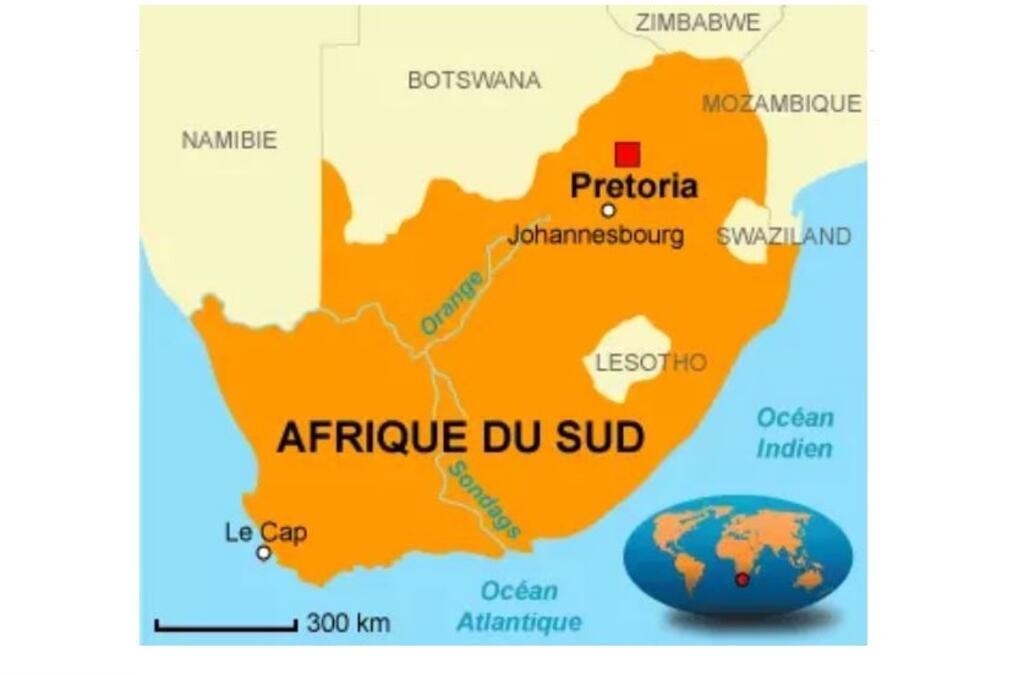
( 翻译和编辑:法广 RFI 电台 尼古拉 )
~. Fin.~

© Courtesy of Houman David Hemmati

美国总统特朗普(Donald Trump)于周六警告,针对在叙利亚中部造成两名美军士兵及一名美国平民翻译死亡的伏击事件,将展开“非常严厉的报复”。美方初步认定,该起攻击由一名伊斯兰国(ISIS)武装分子单独发动,已由美国及伙伴部队将其击毙。
特朗普周六中午在白宫外向媒体表示,美国会对伊斯兰国进行报复,并称罹难者为“三位伟大的爱国者”。
美国国防部长赫格塞斯(Pete Hegseth)表示,发动袭击的“野蛮凶手已被伙伴部队击毙”。他并在X上发文强硬警告:“让所有人知道,如果你在世界任何地方锁定美国人为目标,你短暂而焦虑的余生,将会在美国追捕、找到并毫不留情地杀死你的阴影下度过。”
美国陆军部长德里斯科尔(Daniel Driscoll)也在X上发文表示:“我为殉职的勇敢美军士兵与平民、受伤者,以及承受巨大悲痛的家属祈祷。为国服务的男女代表了国家最优秀的一面,我们哀悼这些英雄,并向他们的奉献与牺牲致敬。”
五角大厦指出,目前事件仍在调查中。一名国防部官员透露,攻击地点并非由叙利亚总统沙拉政府实际控制。五角大厦发言人帕内尔(Sean Parnell)稍早指出,事件发生于叙利亚中部历史名城帕尔米拉,当时美军士兵与一名美国平民翻译正执行任务,遭遇伏击,除三人不幸罹难外,另有三名美军受伤。美国中央司令部表示,伤亡“是由叙利亚境内一名伊斯兰国枪手伏击所致”。
帕内尔在社群平台X上说明,遇袭时美军正在进行“一项关键领导人接触行动”,其任务是支援当地持续进行的反伊斯兰国、反恐行动。基于国防部政策,阵亡士兵姓名及所属单位资讯,将在通知家属满24小时后才会公布。
这次攻击前一个月,叙利亚才刚宣布加入了打击“伊斯兰国”的国际联盟,与美国主导的反伊斯兰国联盟签署政治合作协议,当时叙利亚总统沙拉(Ahmed al-Sharaa)还来白宫作客。
美国驻土耳其大使暨叙利亚特使巴拉克(Tom Barrack)发表声明谴责袭击,表示“哀悼三名勇敢的美国军人与平民,并祝愿受伤的叙利亚士兵早日康复”,同时强调美国仍将与叙利亚伙伴携手打击恐怖主义。
美联社引述叙利亚国家媒体报道,周六袭击事件中的伤者,被直升机送往靠近伊拉克和约旦边境的坦夫驻军。英国设立的叙利亚人权观察组织称,攻击者可能与叙利亚安全部队有关 ,但叙利亚内政部发言人巴巴(Nour al-Din al-Baba)否认该说法,并表示当局仍在厘清凶手是否为伊斯兰国成员,或仅认同其极端思想。
目前伊斯兰国尚未宣称对这次的攻击负责。
目前约有900名美军驻扎叙利亚,作为打击伊斯兰国联盟的一部分。尽管伊斯兰国于2019年在战场上被击败,但联合国评估指出,该组织在叙利亚与伊拉克仍保有约5,000至7,000名武装分子,并持续以潜伏形式发动攻击。
#沙拉领导的沙姆解放组织(HTS)去年推翻长期执政的阿塞德,并与西方国家改善关系,本次事件亦成为阿萨德政权倒台一周年以来,首度造成美军人员死亡的攻击事件,为叙利亚局势再添不稳定因素。

据德国N-TV电视台报道:在周一柏林乌克兰峰会举行前夕,德国总理默茨呼吁欧洲团结一致。他表示:“如果乌克兰倒下,普京不会就此停手”
基民盟籍总理默茨于周六在慕尼黑举行的姊妹党基社盟(CSU)党代会上发表讲话表示,正如1938年那样,对侵略行为的让步并不能带来和平。俄罗斯如果在乌克兰取得胜利,只会鼓励普京,而不会阻止他。默茨呼吁欧洲保持团结,共同扶持乌克兰。他赞成将冻结的俄罗斯财产用于乌克兰的重建。
美国总统特朗普近日对继续与欧洲及乌克兰就和平方案进行磋商流露出不耐烦情绪。但据一名内部人士透露,美国特使威特科夫(Witkoff)和库什纳(Kushner)仍将前往柏林,与泽连斯基和默茨会面。
据一位熟悉情况的美国政府人士介绍,美国将派遣其乌克兰事务特使史蒂夫·威特科夫,以及美国总统特朗普的女婿贾里德·库什纳,前往柏林参加乌克兰和平谈判。两位美方特使将于周一与乌克兰总统弗拉基米尔·泽连斯基、德国总理弗里德里希·默茨、法国总统埃马纽埃尔·马克龙以及英国首相基尔·斯塔默会晤。
德国联邦政府此前通报称,当晚欧盟和北约的领导层也将加入会谈。此外,周日和周一还计划安排威特科夫分别与来自法国、英国和德国的对口官员举行单独会谈。美国总统特朗普此前曾表示,只有在他认为谈判具有前景且已取得实质性进展的情况下,才会派遣正式代表参加相关会议。
这名内部人士指出,派遣威特科夫凸显了华盛顿方面日益增强的紧迫感,即希望弥合与基辅在美国所提出和平方案条件上的剩余分歧。柏林磋商的目标,是就与俄罗斯达成和平协议形成共同立场。法国总统府的一名代表表示,希望为俄罗斯提出一项可供谈判的方案。
据乌克兰首席谈判代表鲁斯捷姆·乌梅罗夫(Rustem Umerov)介绍,此次会谈旨在进一步协调各方立场。此外,与会各方还将讨论,如何将一种类似北约集体防卫义务的安全保障机制纳入和平方案,作为对乌克兰的安全保障。
德国联邦政府已确认,联邦总理弗里德里希·默茨将于周一接待乌克兰总统泽连斯基。除围绕和平谈判的讨论外,两国领导人还将参加德乌经济会谈。媒体报道称,另计划在所谓的“E3”框架下举行会谈,参与国家包括德国、英国和法国。
《奥格斯堡汇报》表示:对乌克兰而言,继续获得援助关乎生死存亡。但是否将冻结的俄罗斯财产用于乌克兰的重建,美国犹豫不决,欧盟内部也争论不休。最终决定可能将在柏林峰会上做出。所以,人们特别担心峰会将失败

 BBC
BBCTwo US soldiers and a US civilian interpreter have been been killed in Syria in an ambush by a lone Islamic State gunman, the US military has said.
The Pentagon said three other service members were injured in the attack, during which the gunman was "engaged and killed".
The identities of those killed are being withheld for 24 hours until their next of kin have been informed.
Defence Secretary Pete Hegseth, said: "Let it be known, if you target Americans - anywhere in the world you will spend the rest of your brief, anxious life knowing the United States will hunt you, find you, and ruthlessly kill you."
This breaking news story is being updated and more details will be published shortly. Please refresh the page for the fullest version.
You can receive Breaking News on a smartphone or tablet via the BBC News App. You can also follow @BBCBreaking on X to get the latest alerts.
Everyone should "follow the rules" when guidance on single-sex spaces is released, the new head of the equality watchdog has told the BBC.
Dr Mary-Ann Stephenson, chair of the Equality and Human Rights Commission (EHRC), said "things could be sorted out if there is goodwill and recognition that everybody has rights", and that "nobody is expecting there to be a toilet police".
The guidance, for businesses and services, was drawn up after a unanimous Supreme Court ruling in April that legally a woman should be defined by biological sex for the purposes of the Equality Act 2010.
The BBC interview, to be broadcast on Sunday with Laura Kuenssberg, is Dr Stephenson's first in her new role.
The EHRC's guidance was passed to the government three months ago, but it has yet to publish it formally, which would give the code of practice legal force.
It aims to provide advice to businesses and services - such as women's refuges, gyms, hospitals or shopping centres - about how the Supreme Court ruling should work.
Seen by the BBC after it was leaked, the 300-page document says single-sex spaces should only be open to people of the same biological sex, otherwise they cease to be single-sex areas.
That would mean, for instance, that a trans woman – a biological male who identifies as a woman - would not be able to use women's toilets and changing rooms.
The guidance says it may be legitimate for businesses or services to ask people to provide confirmation they are of the eligible sex "by proportionate means".
This has all caused controversy and anger among some transgender campaigners.
Dr Stephenson told the BBC: "Nobody is expecting there to be a toilet police.
"But equally if there are situations where there are complaints about regular problems, then people might need to... improve signage, improve explanations, or make sure they have got alternative provision."
She said she expected both service providers and people using these services to "follow the rules".
Dr Stephenson was challenged on what facilities trans people should use if there were no alternatives, or what businesses should do if they did not have the space or resources to make extra provision.
She said: "There's often unisex provision and where there isn't, as I say, we need to think more broadly about how we make sure those that those facilities are available…
"If you've got, you know, two self-contained cubicles, one of which is labelled men and one of which is labelled women, then the most sensible thing in those circumstances for a service provider to do is to make both of those unisex."
Dr Stephenson was appointed to the role in July and she started earlier this month.
It was greeted with hostility by some trans campaigners, in part because she had donated money to the case of lawyer Allison Bailey, who won part of a tribunal claim that she was discriminated against because of her gender-critical views.
In our interview, Dr Stephenson was adamant she could still be objective when considering trans issues.
She said she donated to the case because she was frustrated by situations where "women were being harassed and losing their jobs on the basis of lawfully held beliefs".
She said she had been concerned by the experiences of some women "when trying to have meetings to discuss proposed changes in the law".
"I thought it was important that actually in a democracy, if there is a proposed change to the law, people should be able to meet and discuss those changes without violence or intimidation," she said.
"If that's taking a side, it's taking a side on the side of kind of democratic norms and open discussion and dialogue."
The full interview will be on Sunday with Laura Kuenssberg.

作者:李老白 | 公众号:老白读书
今天看到一组数据,让我对我们的人口现状有了更深刻的认知。
联合国人口司对今年的世界新增人口作出了预测,其结果为——
2025年,中国新生人口数量预计是871万多,占全世界新生人口比例,已跌破7%!
而这个数字在去年还是接近7.4%。
谨慎起见,我要说明一下,这不是我们的官方数据,我们的数据还没公布,这是联合国的预测。
至于这个数字有多准,见仁见智吧。
说回数字。
我国新出生人口占世界总出生人口的比例,最高的时候是达到近27%的,超1/4。
时间点是在建国初期。
随着时间的发展,这个比例逐年走低,直到去年的近7.4%,以及今年的不到7%。
按照预测,这个比值在未来将会更低。
所有这一切都在表明,中国的年轻人都不生孩子了。
为什么?
关于中国的年轻人为什么不生孩子这个课题,研究的人很多,给的答案也很多。
一般情况下,这种复杂问题是没有简单解的。
它一般都是由众多相互关联,或者没啥关系的独立问题所一同造成的后果。
这些独立问题不外乎:
1、经济发展是天然的避孕药。这是有统计数据支撑的。
2、经济下行造就低欲望社会,造成年轻人不想谈恋爱也不结婚。
3、高房价、低收入使年轻人对组建家庭、生孩子失去信心。
4、养孩子太贵了。
5、如今的孩子是消费品,已不具备防老功能,现在养老靠社会。
还有没有?
欢迎大家补充。
这一节我们聊聊如今的年轻人不愿意结婚的话题。
《上野千鹤子的私房谈话III:不那么努力也可以》这本书里,作者曾披露了日本的一组数据:
2000年左右,日本的终身婚率是女性5%,男性9%,都是绝对的少数派。
到2015年再次统计时,日本终生未婚率女性达到了14%,男性达到了23%,增长之势已相当迅猛。
但它仍未达到顶点!
据预测,20年后日本的终生未婚率会达到女性每四个人中有一个,男性每三个人中有一个。
即作者认为,2040年左右,日本将有1/3的男性、1/4的女性终身不婚。
中国的情况如何?
老实说,更惨。
2013年时大多还在10%左右,但到十年后的2022年就只剩下5%左右了,接近腰斩。
并且这个是受经济情况影响的。
经济越发达的地区,年度结婚率越低。如上海市2022年结婚率仅为2.9%,远低于平均值!
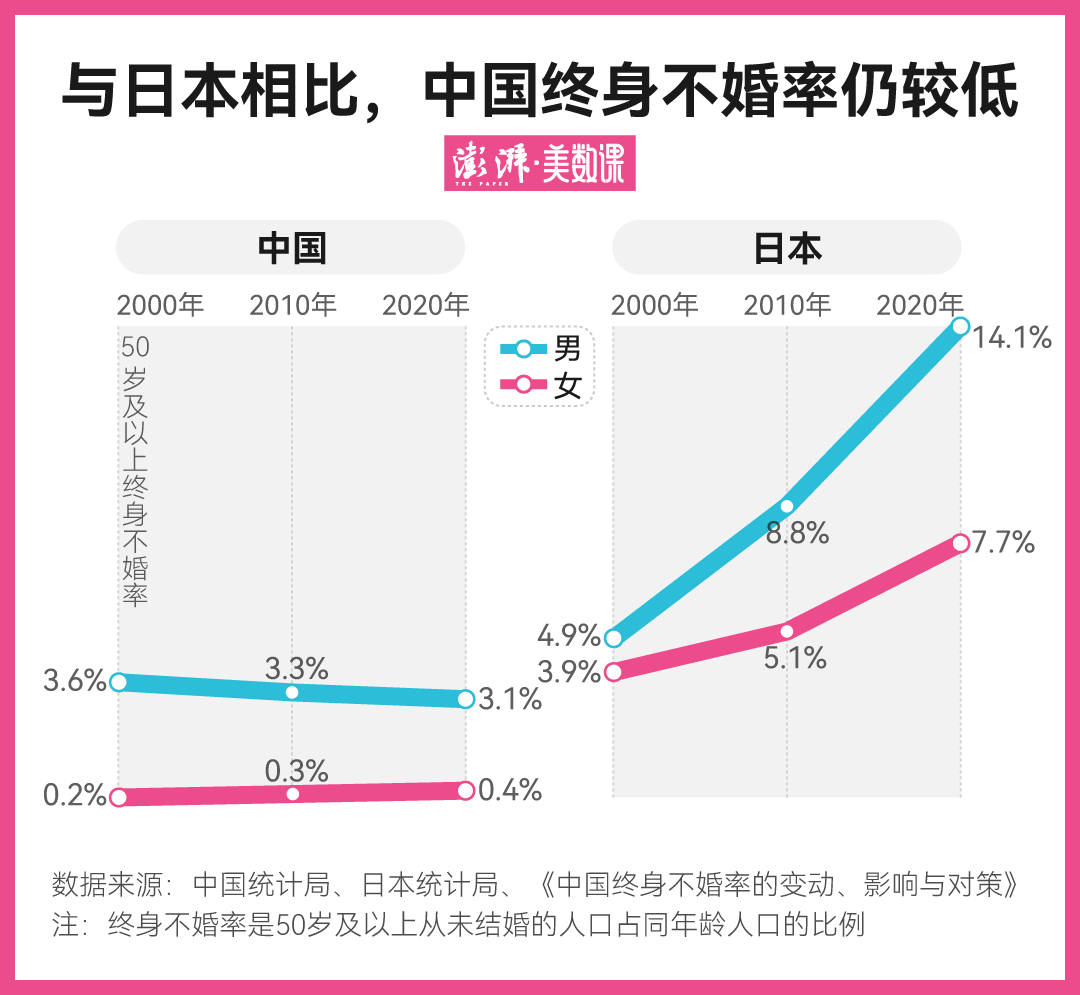

上面这还是三年前的数据。
据我观察,这几年婚恋市场的情况可以用水深火热来形容。
昨天还看到一篇文章里写,武汉某相亲角里的男女比例是1:9,大量女生(或她们的父母)寄希望于那10%的优质男生。
而更多男生,其实根本不会去那种地方“自取其辱”。
上个月Tim事件,只不过是再次证明了这个判断而已。
甚至那个事件被上纲上线,大概还证明了某些群体在这个事件中破了防。
第二个问题我们要说的是,即使结婚了,年轻人也未必会生孩子。
因为他们太穷了,或者说养孩子太贵了。
在《低生育陷阱》中,作者是这么说的:
“因不喜欢孩子才不生孩子的人原本就是极少数,而对于‘想生但因条件尚不具备,所以不生孩子’的多数人来说,开展这类宣传活动也毫无意义。”
并不是现在的年轻人不喜欢孩子了,而是他们迫于种种原因“不能生”。
是什么原因呢?
调查结果如下:
1、“因为孩子的养育及教育太花钱了”这一项遥遥领先。
在30~34岁之间的这个生育主力人群中,因经济问题而放弃生育的比例超过80%!
养孩子太费钱,而年轻人又太穷了。
2、“因为会妨碍自己的工作”和“因为无法承受更多的育儿心理和身体负担”排二、三名。
在30~34岁之间的这个生育主力人群中,这两项占比分别是24%和23%,与第1条有断档式差别。
这两项对应的,我认为主要是现代女性需要工作与育儿两立的问题,这是个很重要的问题。
但经济问题是根本问题。

上面说的是日本,那我们的年轻人是更富,还是更穷?
如果你经常看日剧,会知道当初日本是可以一人上班养全家的,我们做到过吗?
我们这边更多的,恐怕是上班后还得父母时不时资助一下,免得吃土吧。
谁穷谁富,一目了然。
养孩子有多费钱?
《深圳市0-3岁婴幼儿家庭养育成本调研报告》显示,2021年深圳市0-3岁婴幼儿总养育成本平均约74612元/年。
而《中国生育成本报告》中也提到,0-17岁城镇孩子的养育成本平均为63万元;
0-17岁农村孩子的养育成本平均为30万元。
关于这个,我曾以2024年人均消费支出为基础,计算出一组数据:
2024年,我国生育一个孩子并将他培养到大学毕业,平均费用已经上涨至75万以上了。
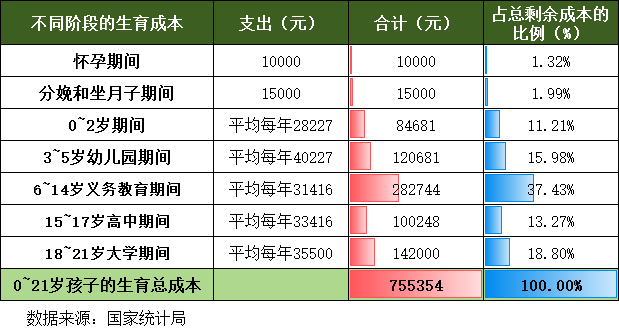
这75.5万只是基础教育支出,在现今这么卷的情况下,很多家长都被给孩子报补习班。
而这又是一个“无底洞”。
当培养孩子的花费水涨船高,大多数人都无法承受时,会带来什么呢?
人们将不愿意生育孩子了。
可能是“少子化”,即便如今生育政策早已放开,很多人也只愿意生育一个了;
也可能是“无子化”,反正也无法指望通过孩子来养老了,不如不生,人生还不那么累。
这么费钱,养个猫它不香吗?
全文完,欢迎在留言区写下您的看法,谢谢阅读!
欢迎转载,请注明来源。


© Doug Mills/The New York Times

© Ints Kalnins/Reuters

 BBC
BBCTwo US soldiers and a US civilian interpreter have been been killed in Syria in an ambush by a lone Islamic State gunman, the US military has said.
The Pentagon said three other service members were injured in the attack, during which the gunman was "engaged and killed".
The identities of those killed are being withheld for 24 hours until their next of kin have been informed.
Defence Secretary Pete Hegseth, said: "Let it be known, if you target Americans - anywhere in the world you will spend the rest of your brief, anxious life knowing the United States will hunt you, find you, and ruthlessly kill you."
This breaking news story is being updated and more details will be published shortly. Please refresh the page for the fullest version.
You can receive Breaking News on a smartphone or tablet via the BBC News App. You can also follow @BBCBreaking on X to get the latest alerts.
作者:我是关尔东 | 公众号:关尔东
卢克文被封号了,准确的说,应该是“卢克文工作室”微信公众号被封,其它平台我懒得调查,只见头条号上,卢克文最近依然在发东西。温和如维舟老师,都用上了“喜大街奔”这样的词。
本次被封的原因跟卢克文的那篇《中国正在做好对日作战的准备》有关。之前,2021年的时候,卢克文因为在《塔利班传》中对拉登表示深深的共情被封,卢克文的共情让无数网友愤怒不已。作为同样一个写评论的,老实说,我不太理解卢克文到底想干嘛,是表达自己观点之锐利,还是不惧流言之勇气,都说不上来。
不过卢克文既然选择写这样的议题,就说明有对应的受众,他们很喜欢看他写这样的东西,一个巴掌拍不响。卢克文成为拥有千万级粉丝的大V,跟这些受众是脱离不开关系的。
近日,卢克文工作室头条号上对于近日的封号风波进行了回应,卢克文展现了很高的格局,谈到作为一个自媒体人,他更在意的是留下什么作品。对此我是同意的,以写字为生的人,混入了舆论圈,大家肯定还是以作品说话。
不知情者,还以为卢克文是写出了《史记》这样厚重的大经典。
问题是他写的是《塔利班传》这些,这样的作品能算得上是好作品吗,能青史留名?卢克文真的有好作品吗,谁来评判关于“好作品”的标准?
是卢克文的粉丝吗?恐怕以他们的趣味,绝大多数我认为已经写出了好作品的作者,他们都觉得是不合格的。
卢克文在封号期间,纠结的竟然是自己的历史定位,这点足够让我感到震惊。而我熟知的一些更为严肃的作者,他们反倒是经常反思:可能我们根本写不出走入经典的作品,这些自媒体文章,很有可能如镜花水月,昙花一现,速朽难长存。
我无意于去嘲讽卢克文的读者,只希望他们能够稍微把眼界拓的更宽一些,既然有能力去读卢克文写的那么长的文章,可见最基本的阅读能力还是有的,那么为什么不多去读更好的更专业的文章呢,止于卢克文是否太过可惜了呢?
不难想象,卢克文绝大多数的受众应该是生活在县城的人,他们有一定的文化,接受过最基本的九年义务教育,对于中专学历的卢克文,他们感到无比的亲切,觉得卢克文是在代表自己这个群体,是在为自己发声。他们对于那些喊口号式的更为粗劣的自媒体写手也感到不屑,因为那些人显得“太没文化”,虽然立场正确,但是没有卢克文那样“博学”,写篇文章都要做非常详实的田野调查,里面还有大量的数据。
在他们的眼中,卢克文相较于那些专家学者们是更“接地气”的,不仅如此,卢克文还是更“有才”的。他们通过卢克文的文章,了解了很多当代中国正在发生的事情,也了解了很多大国之间的关系。
“大国博弈就像打麻将”这样的语言,精准回应了他们对于这个世界的想象,打个麻将这有什么复杂的,只要盯准了卢克文,就不愁自己也可以变得“学富五车”,在朋友聚会的时候,可以轻描淡写地谈论自己对于大国博弈的感受。
卢克文俨然已经成为一个县城智库,成为一种谈资,一个窗口。
唯一的问题是,卢克文说的也不一定对。对于这点他们似乎并不在乎。

© Sean Sirota for The New York Times

 BBC
BBCTwo US soldiers and a US civilian interpreter have been been killed in Syria in an ambush by a lone Islamic State gunman, the US military has said.
The Pentagon said three other service members were injured in the attack, during which the gunman was "engaged and killed".
The identities of those killed are being withheld for 24 hours until their next of kin have been informed.
Defence Secretary Pete Hegseth, said: "Let it be known, if you target Americans - anywhere in the world you will spend the rest of your brief, anxious life knowing the United States will hunt you, find you, and ruthlessly kill you."
This breaking news story is being updated and more details will be published shortly. Please refresh the page for the fullest version.
You can receive Breaking News on a smartphone or tablet via the BBC News App. You can also follow @BBCBreaking on X to get the latest alerts.
King Charles has been praised for his candour in talking about his cancer treatment where he highlighted the importance of early detection and screening.
In a recorded video message, broadcast on Channel 4 for the Stand Up To Cancer campaign, the King said his treatment was being reduced and he urged people to take up offers of cancer screening, saying "early diagnosis quite simply saves lives."
The type of cancer he is being treated for has not been revealed and the King, 77, will continue to receive treatment and monitoring.
Clare Garnsey, associate medical director of Greater Manchester Cancer Alliance, said his message was "very powerful".
The King, who revealed his diagnosis in February last year, is not described as being in remission or "cured" but the regularity of his treatment will be significantly reduced in the new year.
In his video message, recorded in Clarence House two weeks ago, he said that he was "troubled" to learn that nine million people around the UK are not up to date with the cancer screening available to them.
"That is at least nine million opportunities for early diagnosis being missed," he said.
He added: "Too often, I am told, people avoid screening because they imagine it may be frightening, embarrassing or uncomfortable.
"If and when they do finally take up their invitation, they are glad they took part.
"A few moments of minor inconvenience are a small price to pay for the reassurance that comes for most people when they are either told either they don't need further tests or, for some, are given the chance to enable early detection, with the life-saving intervention that can follow."
Speaking to BBC Breakfast, Miss Garnsey said she, "like the majority of health professionals who work in the cancer field" was "really thankful" for what the King said.
"I think the message was very powerful about the importance of early diagnosis and how important it is that we all attend for our screening," she added.
She said it is "really helpful" to healthcare professionals when people in "positions of influence" - such as the King - speak publicly about their experiences with cancer.
These messages highlight that it "can happen to anybody", she said, and raise awareness of the potential symptoms someone may experience.
Royal biographer and friend of King Charles, Jonathan Dimbleby, said the King's message demonstrated the "unique role of the sovereign".
Speaking to BBC Radio 4's Today programme, he said the King's decision to speak openly about his treatment in such "warm, gentle, thoughtful, kind terms" was "quite extraordinary and it has great impact".
Mr Dimbleby said that when it was announced that the King was having treatment for an enlarged prostate in 2024, there was a considerable surge in searches to the NHS website.
"No one else could have done this," he added.
Different types of cancer all have their own symptoms - but the NHS says general symptoms can include:
Until now the King has said little publicly about his illness.
In his video message, King Charles said he knew how "overwhelming" a diagnosis can feel, but stressed that early detection is "key" to give patients the "precious gift of hope".
The NHS has three cancer screening programmes - for bowel, breast and cervical cancer - available to certain age groups.
These tests can detect a problem even before someone experiences symptoms.
In his message, the King also urged people to use the screening checker online tool.
Cancer charity Macmillan Cancer Support said it was "incredibly grateful" to the King for sharing his experience "with such openness and honesty".
"The King's reminder of the importance of screening and early detection is an important message for us all," it added in a statement.
The prime minister said the King's message was "powerful" and that he was "glad" that the King's treatment will be reduced in the new year.
According to Buckingham Palace, the King's recovery has reached a very positive stage and he has "responded exceptionally well to treatment", so much so that doctors will now move his treatment "into a precautionary phase".
The regularity of treatment is going to be significantly reduced - but the King, 77, is not described as being in remission or "cured".
Meanwhile, Dr Harrison Carter, director of screening at NHS England, said the health service "fully supported" the King's call for people to attend screening tests.
"So, when your NHS screening invite arrives, whether it's for cervical or breast screening, or a bowel cancer testing kit through the post, please do make time to take it up."


Sign up here to get the latest royal stories and analysis every week with our Royal Watch newsletter. Those outside the UK can sign up here.

 Getty Images
Getty ImagesCrack open a tub of Celebrations or pull a Terry's Chocolate Orange from a stocking these days, and have you noticed, there seems to be a little less to go around?
Not only that, you might find – no, it is not your imagination – that some popular treats taste a little different, a little less "chocolatey".
To top it all the prices have risen too.
So will your festive favourites still hit the sweet spot this Christmas?
Many of the companies making popular bars and chocolates admit they have been looking for ways to save money. A tried-and-tested one is to replace some of the more expensive ingredients, like cocoa, with cheaper ones, a strategy that's been dubbed "skimpflation".
Some recipes have changed so much that bars like Toffee Crisp, Penguin and others can no longer be called chocolate.
There is even a debate among some chocolate fans over whether the year-round classic Cadbury's Dairy Milk has changed its recipe.
Becca Amy Stock, a TikTok influencer who goes by the name Becca Eats Everything, set herself the task of reviewing every milk chocolate bar at Britain's major supermarkets. The 29-year-old spent six hours and £100 on her rigorous research.
She concluded Dairy Milk was "more oily" since Cadbury's takeover by the American company Mondelez in 2010. And the brand, famous for its "glass and a half" of milk, was less milky, she said.
"You do notice the difference," Becca says, "Cadbury's does not taste how it used to taste."

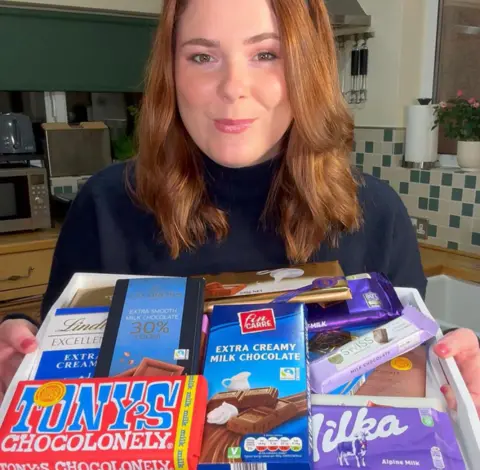 Becca Amy Stock
Becca Amy StockMilk chocolate in the UK must have at least 20% cocoa solids and 20% milk solids to earn the name chocolate. Without that it has to be labelled "chocolate flavour" not chocolate. Cadbury's Dairy Milk still meets that standard.
Mondelez says it has not been fiddling with the recipe, at least not recently.
"Our Cadbury Dairy Milk products continue to be made with the same delicious recipes that consumers know and love," its spokesperson said. "The cocoa content has not changed for many years."
But it is still one which you'll be paying more for.
Plenty of food manufacturers have been reducing the size of their products, without dropping prices, known as shrinkflation.
And some are also putting prices up, too.
Chocolate prices in supermarkets have risen by more than 18% on average from this time last year, according to market researchers Kantar.

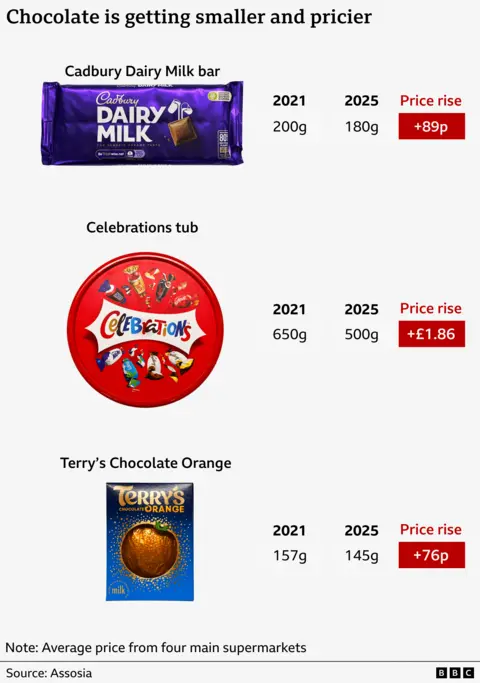
We got these figures by analysing price data collected by market researchers Assosia across four of the UK's biggest grocers, Tesco, Sainsbury's, Asda and Morrisons, between December 2021 and December 2025.
They show:

 Getty Images
Getty ImagesMondelez's spokesperson said putting up prices was a "last resort" but ingredients are costing more - in particular cocoa and dairy.
"This means our products continue to be much more expensive to make.
"As a result of this difficult environment, we have had to make the decision to slightly reduce the weight and increase the list price of some of our Cadbury products," they said.
Mars Wrigley told the BBC higher cocoa prices and manufacturing costs meant they had to "adjust some… product sizes... without compromising on quality or taste."
So what has caused the price of cocoa and milk to shoot up?
Extreme weather caused by climate change has hit cocoa farmers' crop yields in Africa, says Ghadafi Razak, an academic at Warwick Business School.
Extreme rainfall in India, Brazil and Thailand in 2023, followed by droughts the following year have meant poor harvests in those countries too, pushing up prices.
The extra costs take time to feed through to customers, says Christian Jaccarini, a senior food analyst at the Energy & Climate Intelligence Unit think tank, which means those extra costs are hitting shop shelves now.
"It takes about 18 months for the impact of a shock to be felt by consumers, so we still have quite a long time with higher prices for chocolate," he said.
Milk prices have shot up too. Diarmaid Mac Colgáin, founder of the Concept Dairy consultancy blames the rising cost of feed, fuel and fertilisers as well as farmers facing higher wage bills and production costs.
He says some brands have substituted palm oil and shea oil for some of the milk to make up the fat content of their chocolate.
Shoppers are becoming increasingly aware of these cost-saving tactics, but that does not mean they are happy about it.
It is the element of unwanted surprise that can leave a bad taste, according to Reena Sewraz, retail editor at consumer champion, Which?
It can feel "especially sneaky" when companies shrink products or downgrade their ingredients she said.
"With Christmas not far away, shoppers will be looking to get the best value from what they buy," she said. "Supermarkets and manufacturers should be more upfront about making these changes. Customers may not love the news - but [then] at least they don't feel misled."

 Alamy
AlamyBut there is not much you can do about it. For Becca, who insists she's not "chocolated out" despite her chocolate-tasting marathon, quality not quantity is the way to go.
She suggests fellow chocoholics treat themselves to smaller premium bars such as Tony's Chocolonely. They'll cost more but she finds them more satisfying.
She also plans to treat herself to a selection-box on Christmas day.
Otherwise she generally advises against "food snobbery".
"I think supermarket own-brands are actually a much better way to get better quality chocolate."

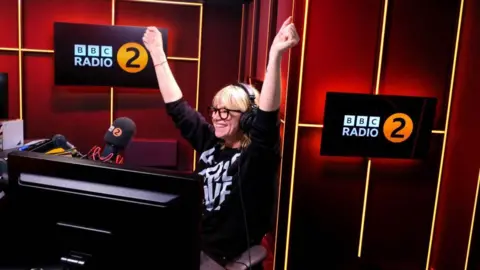 BBC
BBCZoe Ball is stepping down from presenting her BBC Radio 2 Saturday show.
Announcing her departure on air, she said she would be replaced by broadcaster Emma Willis who she described as a "superwoman".
"I love you all to bits, but I'm not disappearing completely," she told listeners.
Ball's final show is set for 20 December, although she will continue to host specials on the station. She left her Radio 2 breakfast show last December after almost six years in the role, before returning to present the 13:00 to 15:00 GMT Saturday programme.
Speaking on the show on Saturday, Ball, 55, said: "I have loved being betwixt my dear friends Romesh (Ranganathan) and Rylan (Clark), and you know, I love you all to bits, but I'm not disappearing completely.
"Obviously, it'll be Christmas Crooners and I'm doing an eras show in the new year, more on that later."
Ball said she was "thrilled" to announce that Willis would take over the Saturday afternoon slot, "a superwoman who is no stranger to you all".
She added that the new host - known for shows including The Voice, Big Brother and Love Is Blind - "will officially become a member of the Radio 2 family".
In a statement, Willis, 49, said "I'm absolutely chuffed to be joining the family - and it's a real honour to follow in the huge footsteps Zoe leaves behind, who's someone I admire and adore."
She said that she would miss listening to Ball but will "happily be the filling to a Romesh and Rylan sandwich".
Willis hosted a show on Heart Radio from 2012 to 2018 and has presented on Radio 2 as a cover presenter since 2019.

有欧洲议会资深议员13日表示,欧盟执委会将会取消原定2035年起,禁止销售燃油新车的计划。此举对德国来说,无疑是一大胜利。
路透社报导:欧洲议会最大党团“欧洲人民党”(EPP)主席韦柏(Manfred Weber)稍早发表声明透露,欧盟可能改用替代方案,要求汽车制造商自2035年起减少二氧化碳排放量90%,而不是全面禁止使用燃油引擎。
这项计划中将要实施的禁令一直是欧盟推动脱碳与加速电动车发展的核心政策之一。然而,欧盟领导层近来面临强大游说压力,特别是德国及其汽车产业为首,强调在面对来自中国的激烈竞争下,欧洲车厂所承受的沉重压力。
欧洲议会最大党团“欧洲人民党”(EPP)主席韦柏在海德堡的记者会上表示:下周二(16日),欧盟执委会将提出一项明确提案,废除对使用燃油引擎的禁令。他还主张,应交由市场与消费者决定如何达成气候目标。
中央社分析认为:韦柏的说法呼应德国奔驰(Mercedes-Benz)与BMW的立场,但与瑞典沃尔沃汽车(Volvo Cars)等已大举投资转型电动化的车厂意见相左。后者认为,欧盟政策如果急转弯,将形同背叛。
沃尔沃汽车商务长塞佛森(Erik Severinson)告诉路透社,欧盟政策如果转向,将削弱产业对未来监管法规的信心。
欧盟执委会预计16日就相关计划进行说明,但表示在正式公布前,不会对任何提案置评。
德国政府近来积极游说推翻禁令,担忧在亚洲竞争对手加速进军欧洲和美国进口关税重创之下,德国国内车厂将承受更大压力。
德国总理梅尔茨(Friedrich Merz)上月致函欧盟执委会主席范德赖恩(Ursula von der Leyen),指出电动车需求未达产业预期,车厂需要更大的政策弹性。
他写道:“欧洲汽车产业的很大一部分,包括德国在内,特别是供应链产业,正处于极为困难的经济情况,因此我们必须尽快修正欧洲的制度框架,确保这个产业在欧洲仍有未来。”

© Niki Chan Wylie for The New York Times

© Getty Images

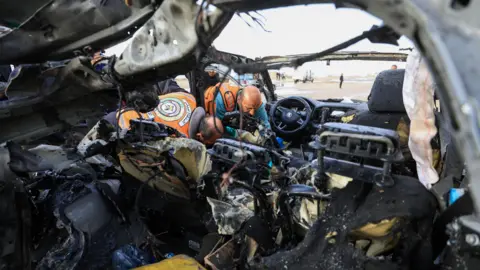 Reuters
ReutersIsrael said it killed a senior Hamas commander on Saturday in a strike on a vehicle inside Gaza.
In a statement, the Israeli military said it had "struck a key Hamas terrorist" in Gaza City.
The Hamas-run Civil Defence spokesman, Mahmoud Basal, told the BBC that four people were killed in the strike. He said multiple passers-by were also injured by the blast.
Local sources said the strike may have targeted Raed Saad, a senior commander in Hamas's armed wing, the Qassam Brigades.
The BBC is prevented by Israel from reporting independently from inside Gaza and is unable to verify details of the incident.
Saad is believed to be a member of the newly formed five-member leadership military council established since a ceasefire took hold in October.
He is regarded as one of the most prominent Qassam commanders and led several brigades during Hamas's 7 October attacks on Israeli communities east of Gaza City.
Israel has attempted to kill him on multiple occasions.
One of the most notable attempts was during a surprise Israeli operation in Gaza City in March 2024, when Israeli forces reportedly sought to arrest or kill him. Sources at the time said Saad had been inside the targeted complex but managed to escape moments before the raid.
He has long been considered one of Israel's most wanted Hamas figures, with Israeli attempts to kill him spanning more than two decades.
Saturday's attack happened on the Palestinian-controlled side of the so-called Yellow Line which has divided Gaza since an unstable US-led ceasefire came into effect on 10 October.
Israeli forces control the area to the east of the line, which includes just over half of the Gaza Strip.
The first phase of US president Donald Trump's 20-point plan for peace in the region required the return of all 20 living and 28 dead hostages taken in the Hamas-led attack on southern Israel on 7 October 2023.
About 1,200 people were killed in the attack and more than 250 people were taken hostage.
All have been returned except for the remains of an Israeli police officer, Ran Gvili, 24, who is believed to have been killed while fighting Hamas gunmen in Kibbutz Alumim.
Since then, according to Gaza's Hamas-run health ministry more than 70,000 Palestinians have been killed by Israeli military action.
The diplomatic focus is now shifting to the next stage of President Trump's plan which would require the disarmament of Hamas as part of what it calls the de-radicalisation and redevelopment of Gaza.
It envisages Gaza being run by the "temporary transitional governance of a technocratic, apolitical Palestinian committee," overseen by a "Board of Peace" chaired by Trump.
Security would be provided by an International Stabilisation Force although its make up remains unclear.
The eventual aim is for a reformed Palestinian Authority to take control of the territory, and for Israeli forces to withdraw, after which "the conditions may finally be in place for a credible pathway to Palestinian self-determination and statehood".
Many aspects of the plan are controversial in Israel where prime minister Benjamin Netanyahu has repeatedly rejected calls for the establishment of a Palestinian state.
Trump is due to meet Netanyahu to discuss the plan in the US on 29 December.

 BBC
BBCTwo US soldiers and a US civilian interpreter have been been killed in Syria in an ambush by a lone Islamic State gunman, the US military has said.
The Pentagon said three other service members were injured in the attack, during which the gunman was "engaged and killed".
The identities of those killed are being withheld for 24 hours until their next of kin have been informed.
Defence Secretary Pete Hegseth, said: "Let it be known, if you target Americans - anywhere in the world you will spend the rest of your brief, anxious life knowing the United States will hunt you, find you, and ruthlessly kill you."
This breaking news story is being updated and more details will be published shortly. Please refresh the page for the fullest version.
You can receive Breaking News on a smartphone or tablet via the BBC News App. You can also follow @BBCBreaking on X to get the latest alerts.

© Getty Images

© Saher Alghorra for The New York Times

© Don Cravens/Getty Images

 BBC
BBCPolice to take no further action over claims Andrew Mountbatten-Windsor asked officer for information on accuser Virginia Giuffre
This breaking news story is being updated and more details will be published shortly. Please refresh the page for the fullest version.
You can receive Breaking News on a smartphone or tablet via the BBC News App. You can also follow @BBCBreaking on X to get the latest alerts.

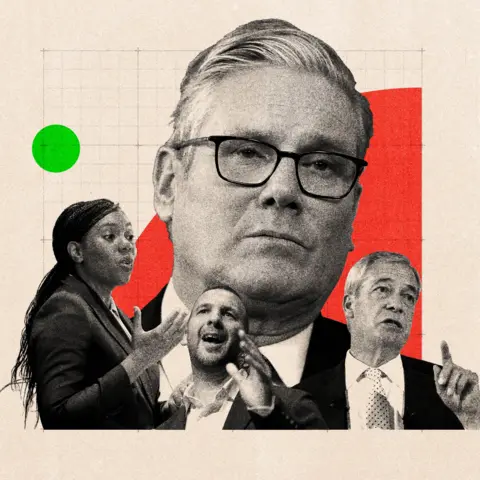 BBC
BBCGoodbye 2025 - almost. It's not worth saying, "Goodness me, the news is crazy".
"Normal" retired many years ago. But which events of this wild year actually changed us, and our politics? And what might 2026 usher in?
As the UK hurtles towards the holidays, I've been asking contacts from across the political spectrum for the moments that boggled their minds this year, and those daring, perhaps foolish, but fascinating predictions of what might come next.
2025 was chock-a-block with events scriptwriters would have found hard to come up with.
There was the Oval Office showdown when US President Donald Trump seemed deliberately to shame the leader of Ukraine, described by one MP as the "maddest moment".

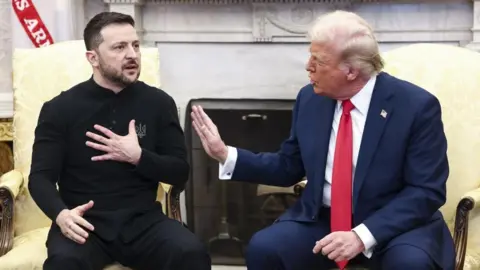 EPA-EFE/REX/Shutterstock
EPA-EFE/REX/ShutterstockAt home: a Labour cabinet minister, Steve Reed, being feted with chants of "build, baby build" and a mini swarm of activists sporting red MAGA-style hats as if, for a moment, Labour's Merseyside conference was like a Make America Great Again rally. You wouldn't have bet on such a surreal scene this time last year.
Chancellor Rachel Reeves crying on camera in the Commons chamber counts too - not just because of the human drama, but because, as one source suggests: "Global investors changed their behaviour as a result."
Yes, the second most senior politician in the land was in tears in public in the bear pit of Prime Minister's Questions.
Yes, the financial markets seemed to react, and secured her job.
The whole Budget set of decisions being published in error by the official number crunchers, the Office for Budget Responsibility, before the chancellor stood up to deliver… the budget, takes some beating as a plot twist.
And a new force on the left emerging under the Corbynista banner, but falling into disagreements with each other in spectacular style - perhaps sadly, for many on the left, that might have been easier to predict.
Don't forget, No 10 advertising its own vulnerability by proclaiming that prime minister Sir Keir Starmer would see off any challengers seeking to oust him – before any of the would-be challengers were remotely ready to come out of the shadows. Nigel Farage's insurgent party, Reform, claiming to have more members than the Tories and Labour.
Those crazy bits aside, time and again, insiders point to three factors of 2025 that have really changed where things are at.
Whether you love, loathe or shrug at the idea of Reform UK prospering, the rise of Farage's party - ahead in the polls for many months - has changed much in the last 12 months.
One former minister says, without question, the most important phenomenon in 2025 is the "rise of Reform and the death of the Tories".
Reform's success in the elections in May gave them power over billions of pounds in local government for the first time. And it put the frighteners on the traditional parties, pushing their policy agendas on immigration in particular.

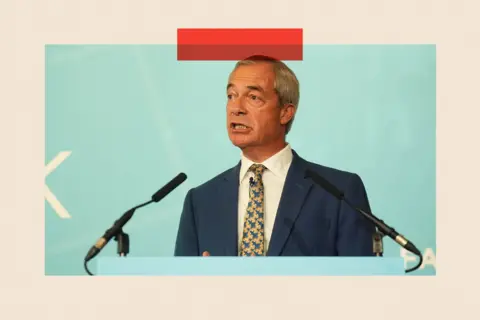 Getty Images
Getty ImagesLabour now walks and talks as if Reform is their main opposition, not the Conservatives, even though their leader Kemi Badenoch's performance has improved in the last few months.
With Reform's polling success comes increased attention, and more scrutiny.
How they handle that, not least allegations of racism, is a question for 2026, but the standard symmetry of politics of Labour v Tories is firmly out of fashion, for now.
Second, multiple sources cite a specific moment. Cast your mind back to the government's ambition to change the creaking system that leaves too many people on benefits without support to find work or improve their prospects. They also wanted to save cash for the taxpayer.
Labour backbenchers were so angry about the implications that after months of campaigning, ministers at almost the very last minute ditched that plan.
The government couldn't be sure it would win the votes, so it gave up, even though ministers say they haven't given up on making changes.
But for a government with a majority you can see from space it was an extraordinary state of affairs, the moment when Sir Keir's authority began truly to drain away.
One Whitehall insider agreed it was the biggest moment of the year, because "almost everything else has flowed from it - from then, the government was not in control of its political destiny with its own party since, and we wouldn't have had the budget we did without it".
For the country's balance sheet, the hoped-for savings disappeared, and with this, critics would suggest, any Labour ambition of saving cash from big changes to policy at home.

 PA Media
PA MediaThat decision set the backdrop for the late autumn budget which had a traditional Labour clarity, but asked firms and families to pay more tax.
One opposition source said the government has showed this year that benefits are "out of control", adding: "The decision to increase this at the cost of working people will have a consequence at the polls."
Even in the Labour Party the upshot is both welcomed and worried about.
One source called the budget "the most significant as they have dumped austerity at all costs and moved away from welfare cuts".
Another told me the whole affair is why Sir Keir, despite his huge majority, ends this political year with no guarantee he'll keep his job in the next.
If 2024 showed Labour could win but would have a hard time adjusting to power, 2025 has raised questions about the extent to which they were really capable of governing well at all.
Whatever has happened at home, 2025 has also been another year of hefty international political moves.
Trump moved back into the White House and really seems to have meant all of the things he told the world he believed in while campaigning.
Sir Keir, while regularly under attack at home, seems to have impressed the American president and some of his home audience. His moment in the Oval Office, proffering the invite from the King for a historic second state visit, "the most heart in mouth" moment of the whole year for some of his allies.
Brokering the most sensitive and the most important diplomatic relationship you have, live on global TV, can't have been the most tempting prospect for a non-showy politician like Sir Keir, who nonetheless, made a success of that moment.
Many insiders suggest the most dramatic and the most important factor of 2025 has been the behaviour of Trump 2.0.
Trump's increasingly insistent demands that Europe pays much more to cover its own defence rather than rely on America have shaped politics everywhere.
His moves to create a ceasefire after the conflict between Gaza and Israel changed the course of the Middle East.
And that's before we even start to consider his flirtation with the notion of creating an all-out global trade war, which hasn't quite come to pass.
2025 saw the UK political establishment get used to feeling constantly nervous about what Trump might do next, the perpetual guessing game of whether he really meant what he said, and what the consequences might be.
As we prepare to say goodbye to 2025, Reform's rise, Labour's woes and Trump's presence have changed our politics. So what will the next twelve months bring?
Predictions are by their very nature a guess.
2025's splintered politics, the current prospering of smaller political parties, the advance of Zack Polanski's Greens, for example, may not last.
The economic fug that has lasted for years might lift, slower inflation and interest rates cuts could shift that stubborn sense that the UK's economic fortunes are characterised by decline.
No 10 hopes its efforts to feed more kids before school by expanding breakfast clubs, cut back NHS waiting lists, provide more childcare and sort out the creaking asylum system could see not just the statistics turn their way but demonstrate that its choices might lead to better experiences for the public and, in time, some political reward - or at least an end to blame and shame.
Breath is already being held ahead of mega-May - a huge set of elections where some predict with confidence Reform will "trounce the others", a former minister says.

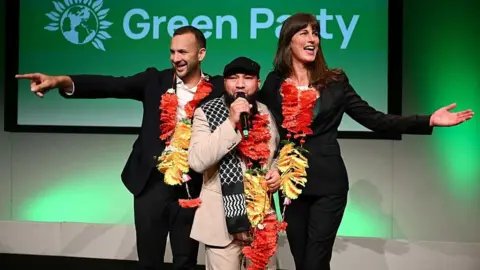 Getty Images
Getty ImagesAn ally of Farage says the "sense of disbelief and disappointment is even greater than it was 12 months ago", predicting huge success in England, and in the Welsh and Scottish elections in May too.
But an experienced Conservative source reckons the most important vector of next year is that Reform will "under-perform against expectations".
Plaid Cymru stopped Reform in its tracks at the Caerphilly by-election in 2025. Farage's rivals reckon voters on the left could come together in the same kind of ways in future.
Perhaps that's more hope than expectation, but it's not impossible that 2025's froth around Reform will subside.
The anxious wait until May's elections is linked to a very common prediction that would have been almost unimaginable 12 months ago.
You've heard the speculation about whether the PM is the right man for the job.
Even some cabinet ministers tell me the May elections will be followed by an attempt to remove Sir Keir.
Whether you think it would be crackers for Labour to try to get rid of one of the two leaders alive who have won a general election, or whether it makes sense to pull up stumps on a prime minister every poll suggests the public doesn't like, many Labour MPs are convinced 2026 will be defined by a "seemingly inevitable" change at the top.
Inevitable is a word used by many. But that doesn't remotely mean it is automatic.
One Labour source says "a lot of mad stuff is going to happen because everyone is acting really stupidly".
Downing Street is making significant efforts to build up the PM's appeal to his own party. Gags abound in Labour about how many MPs have been invited to the PM's country retreat for small talk and canapes.
But in the face of deep unpopularity there is a widespread belief that a bad performance in mega-May will mean the end for Sir Keir.
There is no consensus on who should be next if the PM was challenged.
And there is no certainty a hypothetical challenger would be able to oust him if he, as was provocatively briefed, tried to fight on.
Without doubt his leadership doesn't feel permanent, and that casts a genuine shadow over so much of what the government is trying to do.
But, even when politicians say, "We can't go on like this", a less-than-tasty status quo can still be more tempting than an uncertain road.
Whatever happens at home, naturally in our interconnected world what happens elsewhere - and most notably the whims and wherefores of the American president - will have much sway over everything in 2026.
As I write, European leaders are gathering their teams, fretting, planning, hoping.
Worrying that Ukraine's future is at risk, not just because of the original aggression of Putin's invasion, but because of America's attitude – the desire to end the war seemingly stronger than the belief in Ukraine's integrity.
But for the economy, for our continent's security, and the government's relationship with its most powerful ally, one senior official predicts "the most important thing will be the terms on which a Ukrainian peace settlement comes".
The costs to Ukraine could be costs to European security, and us all.
So as we prepare to say goodbye to 2025, 2026 might be even more eventful. It's not impossible the conflict on the edge of our continent will end, although any agreement to bring it to a close might just store up future problems.
It's feasible there'll be an attempt to get rid of the prime minister, and it's not impossible Reform and the smaller parties will grab more actual power. It won't be long till we find out.
Tomorrow, in our last programme of the year, we'll be joined by Home Secretary Shabana Mahmood and the new boss of the Equality and Human Rights Commission, Dr Mary-Ann Stephenson.
Thank you to you for reading, watching and listening, and Happy Christmas!
Top image credit: Getty Images


BBC InDepth is the home on the website and app for the best analysis, with fresh perspectives that challenge assumptions and deep reporting on the biggest issues of the day. You can now sign up for notifications that will alert you whenever an InDepth story is published - click here to find out how.